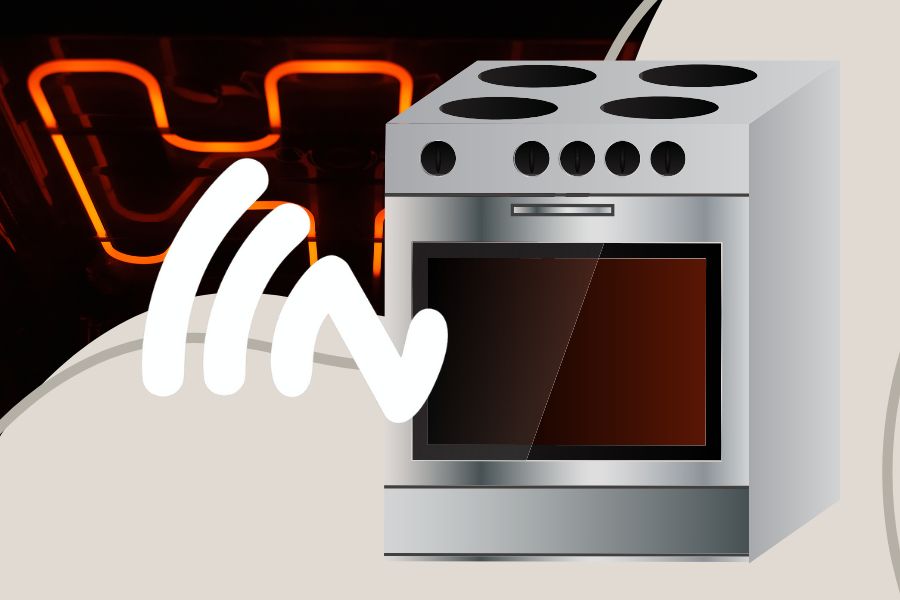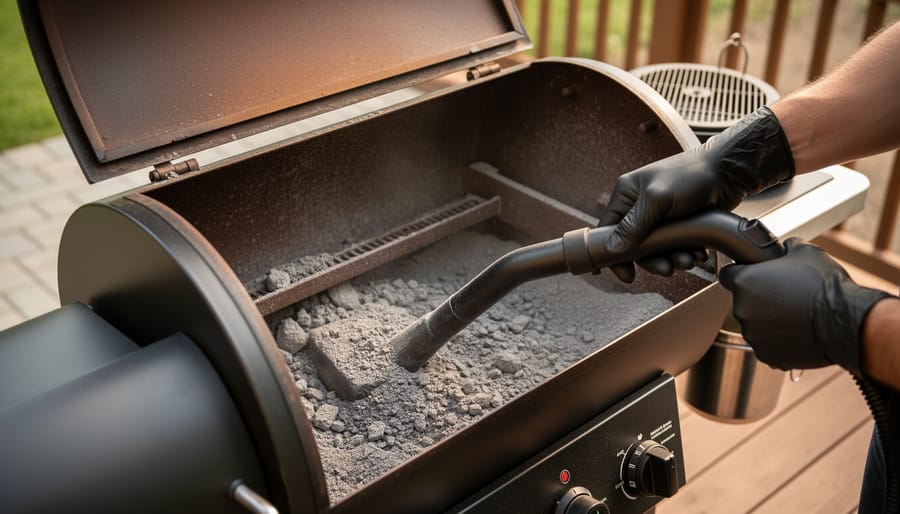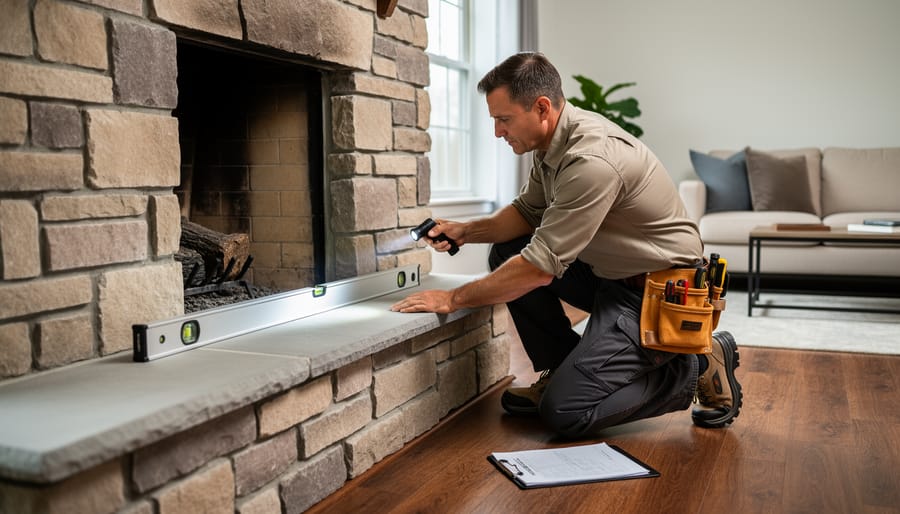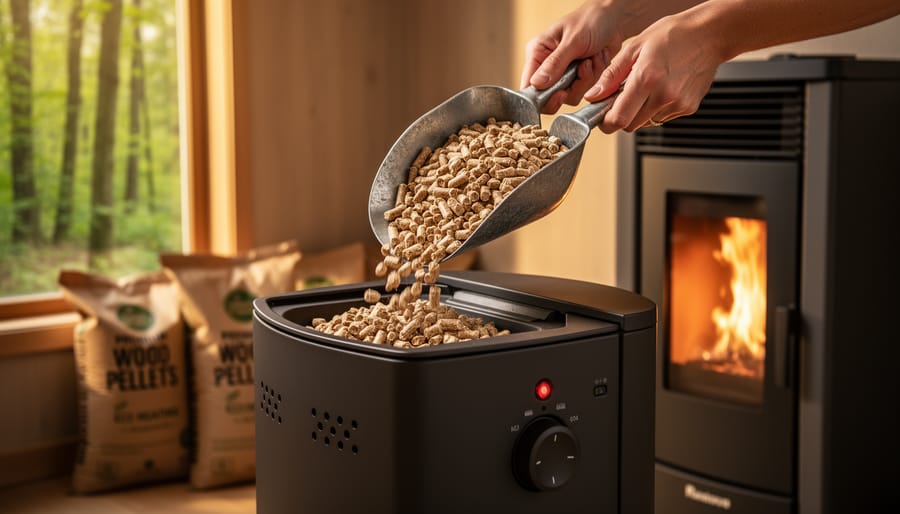If you’re like me, the sound of your electric oven buzzing when heating can be quite unsettling. It’s not something we’re accustomed to, and it can certainly raise questions about the safety and functionality of our appliance.
In this article, we’ll delve into why your electric oven might be buzzing when heating, the potential safety risks involved, and how you can fix the problem. We’ll also share some maintenance tips to help prevent this issue from reoccurring.
So, is it normal for an electric oven to buzz? And more importantly, is it safe to continue using it if it does? Stick around as we answer these questions, providing clear, detailed information to help you navigate this situation.
Stay tuned for a crash course in electric oven troubleshooting. You have the right to a quiet, efficient oven – let’s help you achieve that!
Why Is Electric Oven Buzzing When Heating?
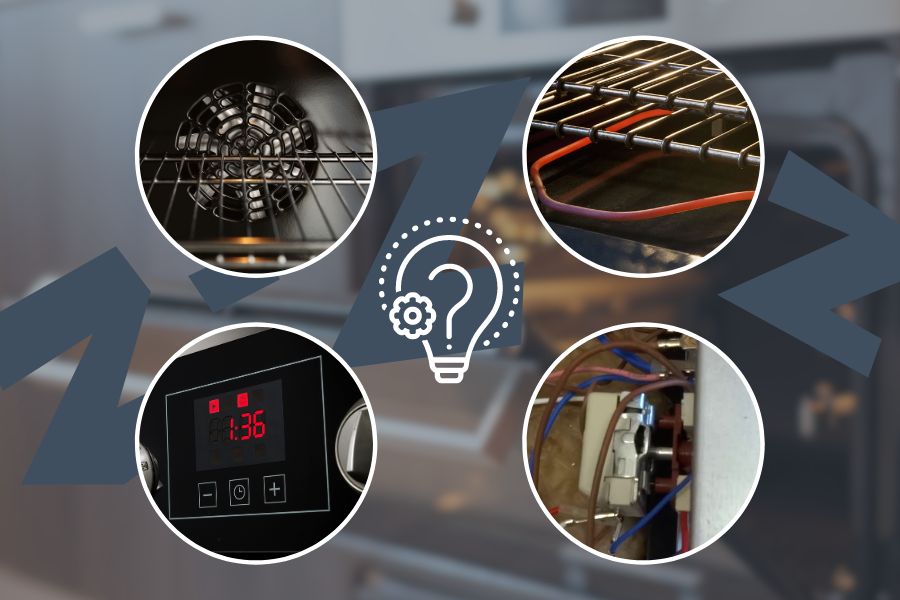
If you’ve ever noticed a buzzing sound coming from your electric oven while it’s heating up, you’re not alone – it’s a common issue that can be quite concerning. The noise could be due to a loose or damaged fan, a faulty heating element, an issue with the oven’s timer, or even a malfunctioning thermostat.
In the following discussion, we’ll detail these potential causes, helping you better understand the problem and how to rectify it.
A Loose or Damaged Fan
You’d be surprised how much racket a loose or damaged fan in your electric oven can make, causing an annoying buzzing sound whenever you’re just trying to cook a comforting meal. This buzzing can be particularly bothersome if the fan is dirty or has somehow become warped.
The fan is a critical component in the oven’s heating process, circulating the hot air to ensure even cooking. It can make your cooking experience far less enjoyable when it’s not working properly.
The effects of this buzzing sound can range from mildly irritating to downright disruptive. It can even make it difficult to concentrate on anything else. So, what does it cost to get rid of this annoyance? Fan replacement costs can vary, but paying for freedom from that incessant buzzing is a small price.
A Faulty Heating Element
Another potential culprit of that pesky noise could be a faulty heating element, struggling to heat evenly and causing your peaceful kitchen to be filled with unwelcome vibrations. This humming or buzzing may indicate that your element isn’t distributing heat as it should. The irregularity in function can make it vibrate, producing that annoying sound.
Understanding the element’s lifespan is crucial to managing this issue. Most heating elements last five to ten years, but this can vary based on usage and maintenance. You may want to consider a replacement if you’ve reached this time frame.
Replacement costs for heating elements are typically low. It’s a small price for freedom from that irritating buzzing and ensuring a well-functioning, quiet oven.
A Problem With The Timer
Let’s notice the timer as a potential source of that bothersome noise, as it can malfunction and cause your oven to heat up for too long or too short. This is often due to a timer calibration issue.
The resolution might differ depending on whether you have a digital or an analog timer. A digital timer, for instance, is generally more accurate and easier to adjust in terms of calibration, while an analog timer might pose a bit more of a challenge.
The buzzing noise could result from your timer straining to keep up with its task. So, it’s worth exploring this possibility if you want your oven to work optimally and quietly. Freedom from this annoying sound is within your grasp!
A Malfunctioning Thermostat
It’s not uncommon for a faulty thermostat to be the intruder causing that irritating noise in your kitchen. This buzzing sound could be a result of the thermostat calibration being off. When set too high, the oven overheats, leading to that annoying buzzing noise. It’s crucial to check the calibration regularly, ensuring it’s in the right setting.
Now, when we talk about thermostats, there are two main types: digital and mechanical. Digital thermostats are more accurate and reliable, with fewer chances of malfunctioning. On the other hand, mechanical thermostats can be more prone to issues, leading to improper heating and subsequent buzzing.
So, if you’re hearing that vexing sound, it may be time to check your thermostat or consider switching from a mechanical to a digital one.
Safety Risks of Using an Electric Oven that Is Buzzing
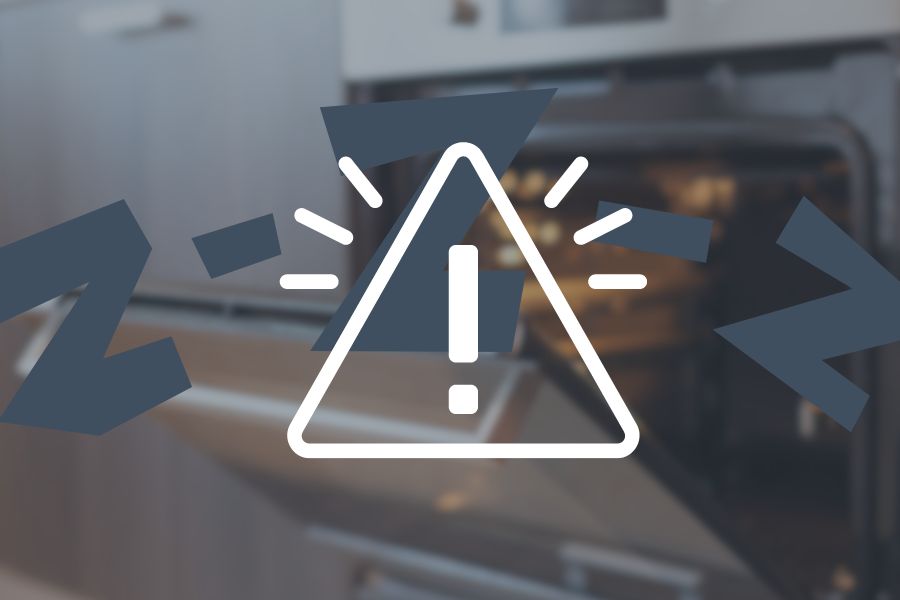
As someone who’s experienced an electric oven buzzing while heating, I can’t stress enough the importance of understanding the safety risks associated with this issue.
It’s not just an annoying sound; it’s a warning sign that you could be at risk of electrical shock, fire, or injury from hot surfaces.
So let’s dive into the details of these hazards to ensure you’re fully informed and can safely navigate the situation.
Electrical Shock
You’re playing with fire, if you ignore the risk of electrical shock from a buzzing electric oven; it’s not just about a ruined dinner, but your safety is also at stake. I can’t stress enough the importance of shock prevention and understanding grounding basics.
The buzz you hear may be due to a faulty heating element that’s improperly grounded or has a loose connection. This is more than an annoyance; it’s a serious safety concern. If it’s not properly grounded, the current could flow through you, giving you a nasty shock.
Now, we wouldn’t want that, would we?
So, don’t try to fix it on your own. Get a professional involved. It’s about your safety, remember? It’s not worth risking your life for a quiet oven.
Fire
Let’s not forget that when that annoying hum from your cooker goes unchecked, a fire may break out, turning your cozy kitchen into a blazing inferno. It all starts with a faulty thermostat or timer, causing your oven to overheat. The heat can then cause materials in and around the oven to ignite. This is a high-risk situation that demands immediate attention.
Fire prevention measures are crucial here. Regular maintenance and troubleshooting of the oven can help evade such disastrous consequences. It’s also wise to keep combustible materials away from the oven.
More importantly, have emergency evacuation plans ready. Knowing the quickest way out of the house can be a lifesaver during a fire. Remember, your life is more important than anything else, so prioritize safety and freedom from harm.
Injury from Hot Surfaces
Beyond the fire hazard, there’s also the risk of getting seriously burned on hot surfaces when a loose or damaged fan comes into contact with them. The heat can warp and melt the fan; if I’m not careful, I could unwittingly touch these heated parts.
To keep my freedom intact, I must prioritize preventing burns. One way to do this is through the diligent use of oven gloves. These aren’t just for taking out your freshly baked apple pie. They’re my first line of defense when I’m inspecting or repairing my oven. The thick fabric offers protection against heated surfaces and stray sparks.
With oven gloves, I can freely navigate the inner workings of my oven, reducing the risk of accidental burns while ensuring its optimal function.
How to Fix the Buzzing Noise in My Electric Oven
When I first heard my electric oven buzzing, I knew figuring out what was causing the noise was important.
After a thorough inspection, I found some loose parts that needed to be tightened and a few damaged ones that required replacement.
However, I realized that some of the noise could be due to an electrical issue, so I called a professional electrician to ensure safety.
Identify the Source of The Noise
You’ve got to find exactly where that buzzing sound is coming from in your oven. It’s key to solving your problem. Start by turning off the oven and listen carefully. The buzzing sound variations can give you key insights. A high-pitched buzz may indicate a different problem than a low, humming noise.
Oven age can impact the type of sound you’re hearing as well. Older models might buzz because of worn-out elements or parts, while newer models could have electronic or wiring issues.
Remember, if you cannot identify the noise source, don’t hesitate to seek professional help. Freedom means knowing when to take the reins and when to trust the experts. After all, your safety and peace of mind are paramount.
Inspect the Oven for Loose or Damaged Parts
After pinpointing the noise, checking out your oven’s interior for any loose or damaged components is crucial. The fan, heating elements, and control panel are prime areas to inspect.
A key part of this process is ensuring proper insulation. Any loose wiring or elements could cause a buzzing noise and pose a safety hazard. Tighten any loose parts you come across and replace damaged ones immediately.
If your oven is still under warranty, damaged parts might qualify for warranty claims, saving you money on replacements. Remember, always handle the components with care to avoid causing further damage.
It’s all about maintaining the freedom of a noise-free and efficient oven. So, take this crucial step in troubleshooting your electric oven’s buzzing noise.
Tighten or Replace Any Loose or Damaged Parts
So, if you’ve found some loose screws or damaged elements in your trusty appliance, it’s time to roll up your sleeves and get them tightened or replaced right away.
You see, loose wiring can cause your oven to buzz, which isn’t only annoying but can lead to a malfunction. The buzzing frequency might increase if the problem isn’t fixed promptly.
First, I’d suggest you turn the oven off and unplug it. It’s always better to be safe than sorry.
Now, take a good look at the wiring. If you spot any loose connections, tighten them up. If any parts are damaged, they’ll need to be replaced. You can usually find the parts you need at your local appliance store.
Remember, maintaining your oven’s health is in your hands. Embrace your freedom and take control!
Call an Electrician if You Suspect an Electrical Problem
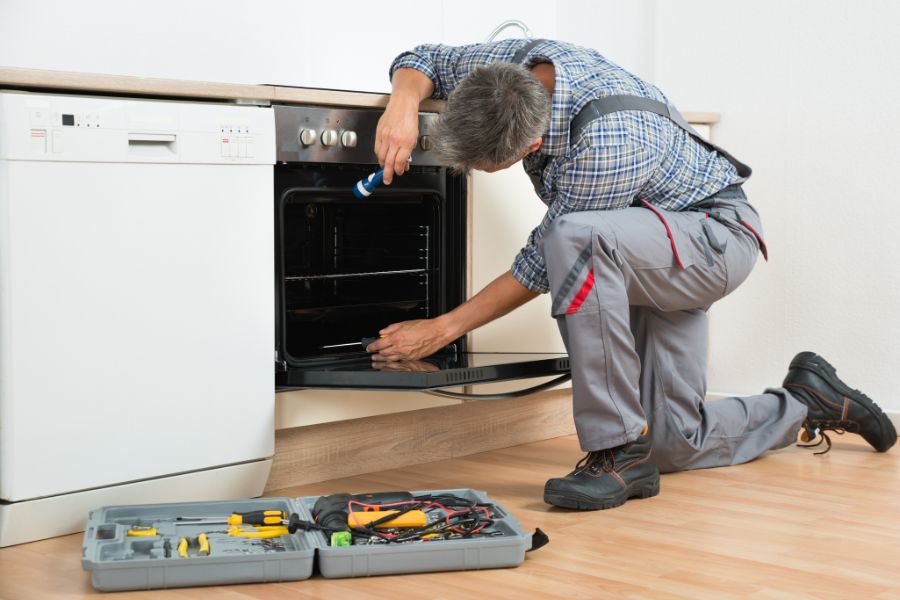
Should there be a suspicion of an electrical issue causing the irritating hum, it’s time to bring in a professional electrician.
As someone who values freedom, I understand the temptation to handle this problem myself. However, it’s best to take your time with electrical safety. An electrician will have the expertise and equipment to diagnose and repair the problem safely.
They’ll be able to pinpoint exactly what’s causing the buzzing noise in your electric oven when heating and provide a solution. Seeking professional assistance in such cases isn’t a sign of defeat but rather a wise decision prioritizing safety and efficiency.
Remember, it’s not just about fixing the issue at hand but also ensuring your peace of mind.
Maintenance Tips to Prevent Buzzing in Electric Ovens
Maintaining an electric oven free from buzzing noises is more manageable than it may sound. With a few simple steps, like keeping your oven sparkling clean and conducting regular inspections, you can significantly reduce the likelihood of noise issues.
Additionally, replace any worn or damaged parts when you spot them. These key maintenance tips will help keep your oven running smoothly and quietly.
Keeping Your Oven Clean
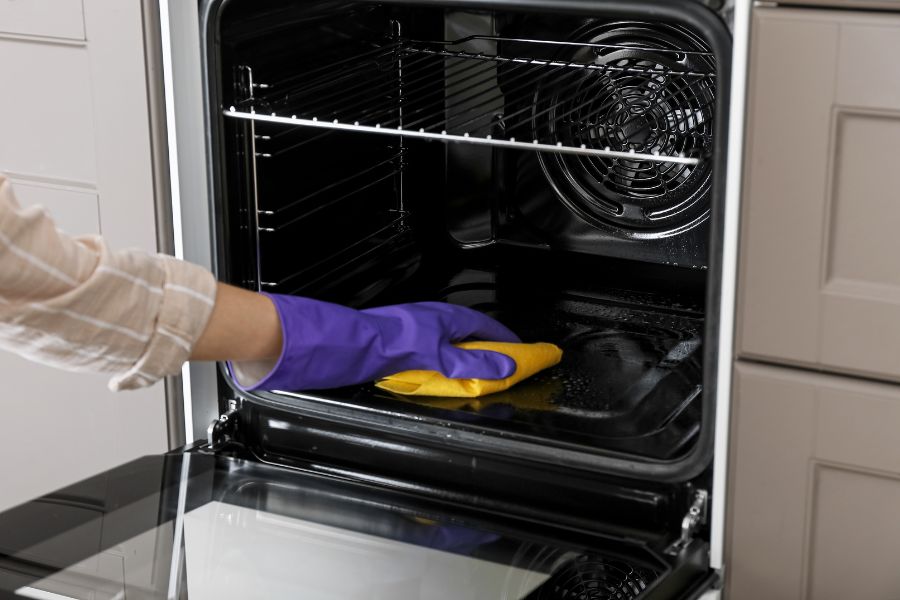
You’ll find that a clean oven operates more quietly and heats more efficiently. By preventing dirt and grease buildup, the fan won’t become noisy, and the oven’s performance won’t be compromised. Cookware impact can also be a factor; if pots and pans aren’t clean, they can cause unnecessary noise and even damage to the oven.
Hence, the cleanliness of your cookware is just as important.
Choosing the right cleaning products is crucial. Some harsh chemicals can cause more harm than good, damaging the oven’s interior or leaving residues that can affect the taste of your food. Always follow the manufacturer’s instructions when cleaning.
A clean oven isn’t just about aesthetics; it’s about maintaining an appliance that can serve you efficiently and quietly.
Inspecting Your Oven Regularly
Your car needs a regular check-up, as does your trusty oven. Regular inspections prolong the oven’s lifespan and ensure energy efficiency.
It’s not all about the shine and the sparkle. I look for signs of wear and tear that could lead to problems. I check the fan to ensure it’s secure and working as it should. The heating elements can’t be overlooked either; any signs of damage could cause the oven to buzz when heating.
The control panel is another crucial area to inspect. Loose buttons or flickering lights could indicate it’s time for maintenance. I can nip any potential issues in the bud by watching these areas and keeping my oven humming happily.
Replacing Worn or Damaged Parts as Needed
To keep your trusty kitchen ally running smoothly, promptly replacing worn or damaged parts is crucial, to ensuring its longevity and optimal performance. When you hear an unusual buzzing sound from your electric oven while it’s heating, it’s clear that something’s amiss. This odd noise could be a symptom of a faulty component that needs immediate attention.
Regarding part longevity, I can’t stress enough the importance of using high-quality replacements. Opting for cheaper, low-quality parts might seem like a good way to save money in the short term, but it can lead to more frequent repairs down the line, which can be costly and frustrating.
Also, remember to check for any component warranties before making replacements. These warranties can provide peace of mind, knowing you’re covered if your new part fails prematurely.
Is a Buzzing Sound Normal for An Electric Oven?
Sure, it’s perfectly normal for your electric oven to buzz, especially if equipped with a fan to circulate the heat evenly. This buzzing noise is a regular part of oven operation, but the frequency variations can differ depending on your oven model differences.
Now, if the buzzing gets louder, it might be because the fan is dirty or damaged. But listen closely because not all noises are normal. A screeching or rattling sound could indicate a loose or damaged fan. Clicking or popping, on the other hand, might mean your heating elements are turning on and off. And sizzling noises? That’s probably food burning on your oven racks or at the bottom.
So keep your ears open for any unusual sounds.
Is It Safe to Continue Using My Electric Oven if It’s Buzzing?
While you may feel uneasy about the constant hum emanating from your kitchen appliance, it isn’t always a sign of danger, and you can still safely use it with a few precautions. The buzzing noise frequency can vary, but it’s not necessarily a threat if it’s due to a loose or damaged fan.
It’s crucial, however, not to overload your oven as it can exacerbate the buzzing and impact your baking quality. Avoid using the self-cleaning feature, too, as it can intensify the buzzing. Always remain vigilant when the oven is in use. If you notice any unusual smells or sounds, turn it off immediately.
Remember, a qualified appliance repair technician should be your go-to solution for any persistent issues.
Conclusion
In conclusion, a buzzing electric oven isn’t normal or safe. It’s crucial to troubleshoot and fix it to avoid potential hazards.
Regular maintenance can help prevent such issues. If your oven starts buzzing, don’t ignore it. It’s not worth risking your safety.

